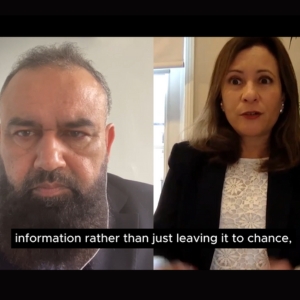Retooling Leadership Teams: the Future of Defence

The UK’s defence sector is changing fast. Increased government spending has been announced, and organisations must act now to ensure they are prepared for 2026/7. Global tensions, rapid technological advances, and evolving security threats demand a more agile and forward-thinking approach. Defence agencies and contractors face mounting pressure to deliver, but without the right leadership structures in place, they risk falling behind. With major investments on the horizon, the priority is clear: leadership teams must be built to handle today’s demands and tomorrow’s challenges.
Across government departments, public bodies and private sector partners working within the defence space, there’s an urgent need to rethink how leadership teams are structured. It’s no longer just about the traditional senior hierarchy. The real requirement is for a dynamic blend of expertise, flexibility and experience, with leaders who can pivot rapidly between strategic planning and operational execution. This isn’t just about filling vacancies; it’s about ensuring leadership teams are fit for purpose in an environment that demands both stability and adaptability.
Interim executives play a vital role in this mix. Often brought in to lead critical transformation programmes or provide immediate direction during times of uncertainty, they bring specialist expertise without the long-term commitment of a permanent hire. Their ability to integrate quickly and deliver results at pace makes them an invaluable asset, particularly as defence organisations wrestle with short-term capability gaps while preparing for long-term strategic change.
Beyond interims, there’s also a growing need for complete leadership teams to be assembled at speed. Whether a government agency requires an entirely new leadership structure to manage a major programme, or a defence contractor needs an embedded team with deep sector expertise, the ability to build leadership capability quickly and effectively is now a core strategic requirement.
Of course, permanent leaders remain fundamental. Stability at the top ensures continuity and long-term vision, particularly for organisations navigating complex procurement cycles and regulatory requirements. But even here, the profile of a successful defence leader is evolving. It’s no longer enough to have deep operational knowledge; today’s leaders must also be comfortable driving innovation, managing multi-stakeholder partnerships and responding to an ever-changing geopolitical landscape.
Security clearance adds another layer of complexity to leadership appointments in the defence sector. Many senior roles require candidates to hold or be eligible for high-level clearances, which can slow down recruitment processes and limit the available talent pool. For organisations needing to move fast, this means working with specialist recruiters who understand the clearance landscape and can identify candidates with the right mix of credentials and expertise.
The impact of defence leadership restructuring extends beyond the traditional military and security sectors. Adjacent industries such as space, and artificial intelligence (AI) are becoming increasingly critical to the defence ecosystem. The UK’s growing focus on space technology, satellite communications, and AI-driven security solutions means that leadership teams must be equipped to manage cross-sector collaboration and technological integration. Defence organisations will need leaders who understand not only military strategy but also the implications of emerging technologies, from autonomous systems to cybersecurity.
The UK’s increased defence spending is on the horizon, but the planning must start now. Government agencies and contractors cannot afford to wait until 2027 to get leadership structures in place. By acting now to secure the right people – whether interims, contractors, or permanent leaders – organisations can ensure they are prepared for the demands of the future.
At Malikshaw, we specialise in sourcing and assembling high-impact leadership teams for the defence sector. Whether you need a senior interim to drive transformation, a full leadership team to manage a critical programme, or a permanent hire with the right security clearance and expertise, we can help. Get in touch today to start future-proofing your leadership team.
Organisational Resilience: Securing the Future

The world isn't getting any simpler. With geopolitical tensions, economic uncertainty, and an ever-growing list of cyber threats, all sectors are under immense pressure to keep their operations running smoothly. The demand for resilience and robust planning has never been higher. But how well prepared are organisations to handle disruption when it inevitably comes knocking?
Resilience and continuity planning have taken centre stage. Leaders are now expected to have contingency measures in place for everything from cyberattacks to supply chain breakdowns and energy shortages. And it's not just about having a plan on paper—those plans need to be stress-tested and updated regularly. The best crisis response is one that's been rehearsed, not one that's cobbled together in the moment.
In addition to traditional risks, the rise of hybrid threats, including disinformation campaigns and economic coercion, adds another layer of complexity. These threats can undermine trust, disrupt essential services, and create economic instability. Emergency preparedness must now go beyond infrastructure and cybersecurity—it requires a well-coordinated response that includes multi-agency cooperation and clear public communication strategies. Organisations need to build the capability to detect and counteract these threats before they escalate into crises.
Cybersecurity has become a critical concern, with organisations of all sizes facing growing threats from cybercriminals, hacktivists, and even state-sponsored attackers. However, the public sector and essential services carry an even greater burden, with strict regulatory requirements and complex operational challenges adding to the pressure. The consequences of a breach in these sectors can be far-reaching, from disrupting vital public services to compromising sensitive national data. Cybersecurity investment is no longer just an IT issue—it's a fundamental pillar of resilience that underpins an organisation's ability to function and maintain public trust.
Transformation managers are at the sharp end of this shift. Zero-trust architectures, advanced threat detection, and ongoing workforce training are no longer nice-to-haves—they're essential. The challenge isn't just finding the right technology, but ensuring people and processes are aligned to defend against the evolving threat landscape. Crisis response systems also need to be strengthened, ensuring that coordination across different departments, industries, and infrastructure organisations is seamless when an emergency strikes.
So, the question is—how prepared is your organisation? Have you stress-tested your continuity plans? Are your cybersecurity investments keeping pace with the risks?
At Malikshaw Interim & Executive, we help organisations get ahead of these challenges by supplying high-quality talent to build successful teams. Our Transformation Trailblazer talent pool provides access to experienced professionals who drive resilience and innovation. Plus, our mentoring programme ensures that key personnel are supported and developed for long-term success. Having worked with key government departments, adjacent agencies, and critical infrastructure organisations, we understand the unique challenges you face. If you're looking to strengthen your organisation's preparedness, we'd love to hear from you.
Today's Women Tomorrow's Tech

Building a balanced team in technology isn't just about ticking diversity boxes—it's about creating an environment where different perspectives drive innovation, improve decision-making, and strengthen businesses. While there has been progress in getting more women and underrepresented groups into tech roles, there's still a long way to go. Ensuring that teams are truly inclusive requires action at every stage, from early education to leadership development.
Encouraging young girls to see themselves in tech careers starts early. Studies show that girls often lose interest in STEM subjects due to stereotypes and a lack of relatable role models. Organisations like Code First Girls, STEM Learning, and Girls Who Code are working to change this by offering training, mentorship, and real-life examples of women thriving in tech. Parents, teachers, and industry professionals all have a role to play in inspiring the next generation.
At the same time, companies need to ensure that women who enter the industry receive the right support to grow and stay. Challenges like workplace culture, limited career progression, and difficulties balancing work and family still push many women out of tech roles. Programmes like the Tech Returners initiative by the UK government and companies like BT are helping women re-enter the workforce after career breaks. Mentorship networks, flexible working policies, and targeted leadership training all contribute to retaining and advancing diverse talent.
Representation at the leadership level remains a challenge, but progress is being made. Companies like BAE Systems, BBC, and Rolls-Royce have introduced leadership development programmes to support women in progressing to senior roles. The public sector is also making moves to ensure women have a voice in shaping tech policies. Setting clear diversity goals and fostering an inclusive culture can make a real difference in breaking down barriers to leadership.
Malikshaw Interim & Executive is also part of this story. By working with training partners, Malikshaw has helped over 345 women gain skills in data and software, equipping them for successful careers in tech. Their partnerships with government agencies, including the Cabinet Office and the Intellectual Property Office, have enabled collaborative projects that promote gender diversity in technology. Malikshaw has also been a strong advocate for increasing the representation of women in technology, supporting both permanent hires and contingent project delivery teams. A standout initiative was the formation of a women-only project team for the Cabinet Office, successfully delivering a 12-month data project for the Chief Digital Office—showcasing the skills and leadership potential of women in tech.
Achieving a balanced workforce takes a long-term commitment from businesses, policymakers, and individuals alike. Organisations like Malikshaw Interim & Executive are proving that with the right initiatives, meaningful progress can be made. By continuing to invest in skills development, inclusive hiring, and leadership support, the tech industry can create stronger, more diverse teams that drive innovation and success.
Rethinking Talent Pipelines

Tech recruitment isn't what it used to be. The days of requiring a computer science degree from a top university are fading fast, replaced by a more dynamic, inclusive approach to building tomorrow's workforce. Employers are waking up to the fact that potential is just as important—if not more—than a polished CV packed with traditional credentials. The real question now isn't just "Where did you study?" but "What can you do?"
Beyond technical expertise, adjacent skills are becoming increasingly relevant in tech careers. Creativity, problem-solving, and critical thinking are just as important as coding ability. Employers are also valuing skills like project management, storytelling, and customer engagement—areas traditionally associated with other industries. The ability to collaborate across disciplines, translate complex ideas into accessible concepts, and approach challenges with curiosity and resilience is helping to bridge the gap between traditional and non-traditional tech talent. These skills, often honed in roles outside of tech, are proving invaluable in an industry that thrives on fresh perspectives.
The smartest companies are shifting their focus, looking beyond the usual hiring pools and embracing new ways to identify and nurture talent. Tech bootcamps, upskilling courses, and apprenticeship programmes are proving that a non-traditional route into tech can be just as effective as the classic university path. These alternative pipelines are making it easier for people from different backgrounds, including women, ethnic minorities, neurodivergent individuals, and career changers, to get a foot in the door and thrive in the industry.
In the public sector, digital apprenticeships are a game-changer. They offer hands-on experience, paid training, and a direct route into meaningful tech roles, proving that you don't need a degree to succeed in this field. Meanwhile, private sector initiatives like Women In Tech and Code First Girls are breaking down barriers, helping women develop the skills and networks they need to excel in the industry. Companies that partner with these organisations aren't just filling vacancies; they're building a future-ready workforce that's more diverse, innovative, and representative of society as a whole.
It's not just about hiring differently—it's about inspiring the next generation early on. Employers who engage with schools and universities, running coding clubs, mentorship schemes, and hackathons, are helping to demystify tech careers. By showing young people—especially those who might not have considered tech as an option—that this world is open to them, they're widening the pipeline in ways that will pay off for years to come.
And why does all this matter? Because the future of tech depends on it. The industry needs a broad range of perspectives to solve the world's biggest challenges, and that won't happen if recruitment is stuck in an outdated loop. An inclusive talent pipeline isn't just good for individuals—it's good for business, innovation, and society as a whole.
At Malikshaw, we're committed to being part of the solution. We actively work with organisations to help them reimagine their hiring strategies, ensuring they attract, develop, and retain a diverse range of tech talent. By championing non-traditional routes, supporting outreach initiatives, and fostering inclusive workplaces, we're helping to shape a tech industry that's not just ready for the future—but leading it.
Level Playing Field

I recently had the pleasure of meeting Shirley Cooper OBE—Crown Representative. Our conversation was both insightful and inspiring, touching on the challenges that SMEs face when supplying government departments. Shirley’s deep understanding of public sector procurement and her advocacy for greater SME inclusion made for a valuable discussion. It was refreshing to engage with someone who not only recognises these challenges but is actively working to improve access and opportunity for SMEs.
From navigating complex frameworks to ensuring cash flow resilience amid long procurement cycles, the hurdles facing SMEs in this space are significant. However, with the right structures and policies in place, these challenges can be mitigated. Our discussion reaffirmed the need for ongoing collaboration between government bodies and SMEs to foster innovation, agility, and efficiency in public procurement.
The introduction of The Procurement Act 2023 marks a big shift in how procurement is managed across government and the wider public sector. While the ambition to create a more transparent, accessible, and competitive landscape is commendable, the real test will be in how it plays out in practice.
For SMEs, the Act brings both opportunities and uncertainties. On the one hand, there’s a push to simplify procurement and cut unnecessary complexity, which should make things easier for smaller businesses to compete. On the other, adapting to new rules, compliance measures, and the inevitable early-stage issues could be tricky.
A key question is whether the Act will genuinely level the playing field or whether established procurement practices will continue to favour larger players. SMEs bring innovation, flexibility, and efficiency—qualities that are vital for public sector transformation. If the Act can genuinely break down barriers and make competition fairer, the benefits could be huge.
At Malikshaw, we’ve worked with many major government bodies like Homes England, the Office for National Statistics (ONS), and the Cabinet Office. These partnerships have shown us just how important SMEs are in delivering value to the public sector. Across all these organisations, a common theme has emerged—SMEs play a vital role in fostering agility, driving innovation, and bringing fresh perspectives to complex challenges.
Take our Transformation Trailblazers programme, for example. Pretty much every major consultancy agrees—around 70% of transformations fail to meet their objectives. And the number one reason they give? Poor leadership.
Now, the big four consultancies, who are often the government’s go-to for advice, naturally promote their own people rather than looking to independent expertise. But here’s the thing: the real game-changers—the people who’ve actually delivered the most successful transformations—often sit outside those firms. And by default, that means government could be shutting itself off from the very talent that could turn this statistic around.
Of course, levelling the playing field is a shared responsibility across all kinds of organisations. But a programme like Transformation Trailblazers, which gives government direct access to the most proven and successful transformation leaders, is invaluable. And the reality is, that kind of access only truly comes through SMEs like Malikshaw.
Whether it’s supporting infrastructure projects, enabling digital transformation, or contributing to procurement reform, smaller businesses are consistently demonstrating their ability to deliver tailored, effective solutions that larger firms often struggle to provide. The government’s commitment to increasing SME participation is promising but making procurement frameworks genuinely accessible and ensuring this flows throughout the supply chain, will be crucial to success. A point that clearly resonated with Shirley.
Looking back on our experiences, it’s clear that SMEs aren’t just suppliers—they’re crucial partners in public sector transformation. Our ability to build strong teams, move quickly, and bring fresh perspectives makes us invaluable to government projects.
At Malikshaw, we don’t just deliver projects. We help drive transformation—whether that’s through digital solutions, policy support, or strategic change. We build resilient teams, encourage innovation, and make sure public sector initiatives achieve real results.
The procurement landscape is changing, and while there are challenges ahead, there are also plenty of opportunities. The Procurement Act 2023 is a step in the right direction, but its impact will partially depend on how well government departments embrace the potential of SMEs. With continued collaboration, strong advocacy, and a focus on delivering real value, we can help shape a procurement system that genuinely supports innovation and efficiency.
I’m looking forward to seeing how this develops and will keep sharing insights as we navigate this evolving space.
Rob Shaw
Director















